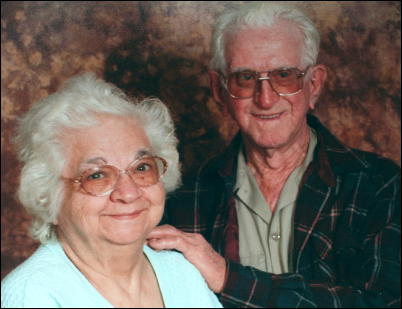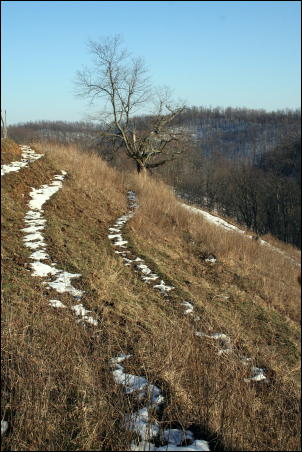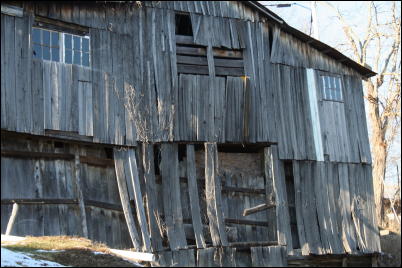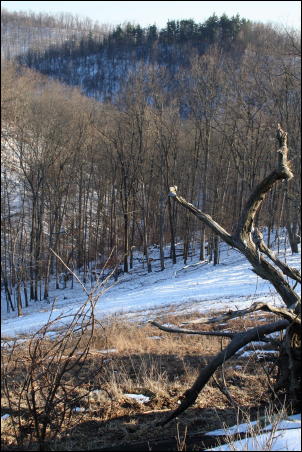NEVER A DULL MOMENT WITH LEAH DAVIS - Sand Ridge Woman Recalls Life

Leah Jean Lockney Davis and her late husband, Cecil
Davis, who died August 9, 2008 at the age of 93 years
Reprinted with permission by
Margaret Smith Volkwein 2009
"Be sure to tell everyone how ornery and contrary I am," Leah Jean Davis says firmly. "Contrary old Mary of Sand Ridge, that's me."
"You make more tracks than a possum," she points out. I slow down and listen. "That's what my dad used to tell me," she says, and laughs.
"Never a dull moment," Leah Davis says about her life. You may remember her as the manager of Suzie's Dairy Delight in Arnoldsburg, when she lived where the Speedy Mart is now. [Wish I had a Snickers Delight right now.] You may remember her as the bluegrass music fan who lives on the Sand Ridge hill farm where she spent most of her life.
Leah Jean Davis was born February 13, 1929, daughter of John Roy and Eula Schoolcraft Lockney. Brother Robert and sisters Goldie and Wilda shared her childhood. She was born on Little Bear Fork, at the foot of Sand Ridge in Calhoun County, West Virginia.

Cattle trails on steep Sand Ridge
hillside (Photo by Margaret Volkwein)
"Log house I grew up in, still there, my grandpa's house, where my dad was raised...It had two stories, and a porch that went all the way across...They've covered it up with siding. It had two big rooms upstairs, and a living room, and kitchen built on the backside of the house, and a good big bedroom, had a big fireplace in the living room.
The stave mill caused Big Bear Fork to be clearcut. "Dad and Mom lived in one of the shanties they'd built out there...that was the only work there was at that time, when they was married...That short line, the railroad, used to go there, to the stave mill."
"Used to be a schoolhouse in there, I remember when it was still in operation..." she recalls. At the foot of Sand Ridge hill was a schoolhouse on her dad's property, which was Little Bear Fork School. On the last day of school every year they had a picnic. "Kids from Crummies Creek School would come, play ball, picnic all day long..." she reminisces.
In 1938 Leah's dad built a new house up on Sand Ridge "because he got free gas, didn't have to chop wood. My dad cut the trees down on our place, to build that house over there, and he cut some to make cross ties, he'd sell cross ties when he wanted some money for something." Leah Davis' dad built a house, garage, and barn out of trees cut and sawed into lumber on the farm.

Barn likely constructed by Leah's father,
John Lockney (Photo by Margaret Volkwein)
When her parents were first married, they had a wagon and team. "By the time I came along we had a pickup truck." The family would go to Spencer to shop at the A&P store for groceries, where the Save-A-Lot is now. Route 33 was graded in 1926. The crew took out rocks, filled ditches, then finally paved the highway in 1928. Her dad gave the kids treats, like a movie in Spencer once a week, and every year a carnival or fair in Glenville.
About laundry, Leah Davis says, "Big bar of yellow soap, OK soap, my mom'd use that soap to wash laundry every week. She's boil it up in a big kettle out in the back yard, out in the wood yard."
Leah and her brother and sisters gathered wild food like hickory nuts, walnuts, poke, milkweed, and wild greens. They spotted deer grazing with the sheep occasionally. They ate squirrels, but the chestnut groves of Appalachia were already gone from the area, killed by the blight.
They raised hogs and killed three or four big hogs every fall. Hereford cows grazed in the bob wire and split rail fences, with a Jersey cow for milk. Her dad cut hay with a mowing machine and a team of Belgian horses, hauling it to the middle of the meadow. There they built fence around the hay, turning the animals loose in the big field every winter.

Calhoun Hills near Bear Fork wilderness
(Photo by Margaret Volkwein)
Leah says, "I worked like a man out on the farm, plowing, sowing, planting, cutting and putting up loose hay. Turnips and pumpkins...we put up three, four hundred quarts every year, forty, fifty bushel of potatoes, Irish cobblers. Picked blackberries all over the farm, we'd can 'em and make jelly...we'd let people come, anybody that wanted to, come and pick berries. Raised field corn, eight-row white corn."
Leah Lockney married Cecil Davis in June 29, 1950. They were married for 58 years. "Me and my husband raised Bloody Butcher corn for meal, tomatoes, beans for fodder and for pickled beans, squashes, a little bit of everything. My husband would haul coal, and I'd go with him sometimes, in a big truck. Fifty bushel at a time to households that didn't want to cut wood."
During the Depression, "Nobody had anything but everybody had something to eat." The big Spanish flu epidemic after WWI hurt more than anything else.
"My dad and grandfather used to go into the houses, there'd be whole families had died, had to take the horses and sleds and haul them people out. They'd make pine boxes for 'em."
Leah Davis says, "Hand me the phone, I want to devil somebody a little bit...have her jumpin'."
Later that afternoon she dozes in an easy chair.
She laughs in her sleep.